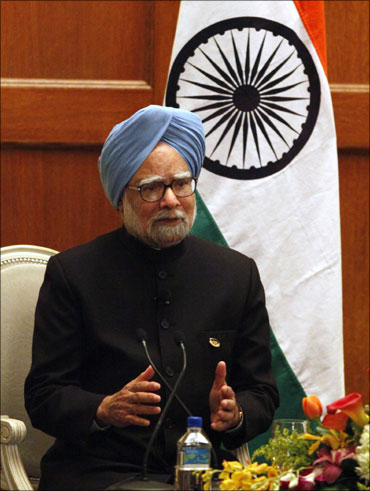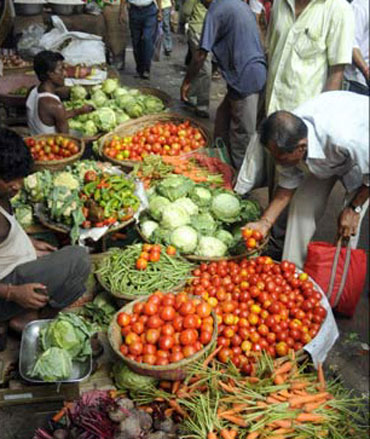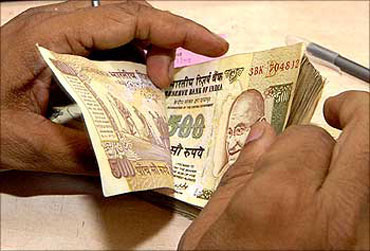
Prime Minister Manmohan Singh on Monday said the government is working towards creating an atmosphere where trade and industry come forward to reserve jobs for the socially underprivileged -- a practice in vogue in the public sector.
Reserving jobs in private sector or affirmative action was part of the national Common Minimum Programme of UPA-I and it had initiated a national dialogue with political parties and industry to see how this can be implemented.
"To take forward the affirmative action, we need to create an atmosphere so that trade and industry participants help us on this issue. We are working hard towards that and we acknowledge it needs to be taken forward fast," he said replying to a question on progress on affirmative action.
The UPA-I had said in May 2004 that it "is very sensitive to the issue of affirmative action, including reservations, in the private sector.
"It will immediately initiate a national dialogue with all political parties, industry and other organisations to see how best the private sector can fulfil the aspirations of scheduled caste and scheduled tribe youth."
At present, the law provides for reservation for Scheduled Castes and Scheduled Tribes, among others, in public sector jobs, besides quota in education.
NEXT: PM promises action if telecom corruption proven

Prime Minister Manmohan Singh on Monday responded to allegations of corruption against Telecom Minister A Raja over sale of licences in 2008, by promising to take action if corruption was proved 'at any level'.
Acknowledging that the recent auction of 3G spectrum had yielded nearly Rs 68,000 crore (Rs 680 billion) as against about Rs 10,000 crore (Rs 100 billion) from 2G licences, granted two years ago, Singh, however, said that pending investigations by CBI, it would not be proper for him to express any "definitive opinion".
The prime minister said Raja had told him that "what he did was, implemented the policies which were in place since 2003 (NDA regime)."
The opposition has been seeking Raja's resignation saying the alleged scam in 2G licence sale caused a loss of up to Rs 1 lakh crore (Rs 1 trillion) to the exchequer.
Answering a query at the first national press conference of the UPA-II, Singh said: "I have also discussed this issue with Raja... he has told me that what he did was, implemented the policies which were in place since 2003 (NDA regime)."
Singh said Raja, who represents DMK in the Union Cabinet, has also made his position clear in Parliament and in the media.
The prime minister, however, acknowledged the huge gap in the revenue generation from 2G licences (given away by Raja in 2008) compared to a whopping Rs 67,700 crore (Rs 677 billion) from the auction of 3G spectrum sale that concluded only last week.
"I think one has to look at the whole problem in proper perspective. There was a particular policy which was in place since 2003 before our government came into power," Singh said, adding that Raja's point was that it would amount to discrimination if different yardsticks were applied for the new entrants.
Pointing that the whole issue was being investigated and the CVC has asked the CBI to look into this and the process is on, he said and assured: "If I come to know that there is any involvement at any level in corruption, we will take action."
The pricing for 2G spectrum was based on policies that were already in place and had approvals of the Telecom Regulatory Authority of India, Singh quoted Raja as having told him.
NEXT: Price-rise to be curbed by Dec, says PM

Prime Minister Manmohan Singh on Monday said that rising prices continue to be a matter of deep concern for his government.
However, he also said that the government was confident of bringing down inflation to 5-6 per cent by December, while blaming high prices on the global developments such as the financial crisis.
"Prices continue to be a matter of concern. . . it is affecting the country's masses ... but I believe by December we can bring it down to 5 to 6 per cent," he told reporters at his national press conference here to mark the completion of one year United Progressive Alliance-II in office.
"The government attaches the highest priority to containing inflation so that there is no distress to the common man. As a result of the steps we have taken, there are signs of prices showing a moderating trend,' the prime minister said on the occasion of completion of one year of the UPA government in its second term.
"We will closely monitor the situation and, together with state governments, take all corrective steps to bring down prices and protect the vulnerable sections of our society from the impact of high prices," he said in his opening remarks to the media on Monday.
He also said that the government's first priority was to protect the economy from the global slowdown and ensure that the momentum of inclusive growth did not get interrupted.
Singh said the government has been monitoring inflation and has been taking measures to check the rising prices, particularly food products hit by poor monsoons last year.
"But for this (high inflation), international financial crisis and high prices of petroleum prices in global markets are to blame.
"Besides, droughts and floods in some parts of the country last year affected our economy as whole," Singh said.
Monsoon accounts for a bulk of rains India receives and nearly 66 per cent of the country's agriculture sector depends on rains for cultivation.
High food and fuel prices fuelled overall inflation to over 10 per cent in February and provisional numbers for April put it at 9.59 per cent.
NEXT: Govt targets 10% growth in medium term

Prime Minister Manmohan Singh said on Monday the economy is expected to grow by 8.5 per cent this fiscal and the country was capable of achieving 10 per cent expansion in the medium term.
The forecast comes on top of an estimated 7.2 per cent growth in 2009-10, the year that saw India weather the effects of the global economic crisis.
"We need a rapidly growing economy to generate productive employment and also resources to finance our ambitious social and economic agenda," Singh said at a national press conference in New Delhi to mark completion of one year of United Progressive Alliance-II in office.
Growth had slipped to 6.5 per cent in 2008-09 at the height of the economic crisis triggered by collapse of financial institutions in the West.
The prime minister said the government's medium term target is to achieve a growth rate of 10 per cent per annum.
"I believe that the mandate of the 2009 elections was a vote for the inclusive agenda of the UPA government that sought to give voice to all sections of the Indian people and to empower them," he said during his opening remarks at the national press conference held in New Delhi.
The prime minister said the agenda for the UPA's second term seeks to strengthen the pro-people policies and programmes initiated by the government since 2004.
"The social and economic uplift of the Scheduled Castes and Tribes, other backward classes, minorities and women will continue to receive priority attention in our plans. We need a rapidly growing economy to generate productive employment and also resources to finance our ambitious social and economic agenda.
"Our medium term target is to achieve a growth rate of 10 per cent per annum. I am convinced that given our savings and investment rates, this is an achievable target," he said.
The prime minister said its achievement will require determined efforts to increase investment in social and economic infrastructure, enhance productivity in agriculture and give a fresh impetus to the manufacturing sector.
NEXT: NREGA progressing well, says Manmohan

Prime Minister Manmohan Singh on the occasion of completion of one year of the UPA government in its second term said on Monday that the flagship programmes launched by his government are progressing well.
"I will briefly highlight some of the important steps we have taken over the past year and also the pressing challenges that confront the nation,' Dr. Singh said during his opening remarks at the national press conference held in New Delhi.
"Our flagship programmes such as the Bharat Nirman, the Mahatma Gandhi National Rural Employment Guarantee Scheme, the National Rural Health Mission and the Jawaharlal Nehru National Urban Renewal Mission are progressing well. We are on a learning curve and we can and will do more to strengthen these programmes and improve delivery," he said.
The prime minister said that the Right to Education Act enacted last year is a historic step forward in making every Indian a literate and empowered citizen.
"We are undertaking a comprehensive review of our system of higher education, including medical education. A draft National Council for Higher Education and Research Bill has already been put in the public domain," he said.
To strengthen political inclusion, the prime minister said that the government has introduced bills to provide 50 per cent reservation for women in all panchayats and urban local bodies.
"Nearly 1 crore (10 million) scholarships have been granted last year to students belonging to the SCs, STs, other backward classes and minorities. A large proportion of these scholarships have gone to girls," he said.
"We launched the Jawaharlal Nehru National Solar Mission in January this year. It aims to create a capacity of 20,000 MW grid solar power by 2022. We have decided to set up a National Social Security Fund for workers in the unorganized sector with an initial corpus of Rs 1,000 crore (Rs 10 billion).
"A draft National Food Security Bill is under preparation," the prime minister added.